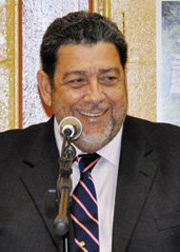
KINGSTOWN, St. Vincent – Lawmakers here last week passed an anti-human trafficking law, reducing the nation’s chances of being sanctioned by the United States, having been placed on a human trafficking watch list for three consecutive years.
The State Department, in is Trafficking in Persons Report in June, again placed this country on a Tier 2 watch list of nations “whose governments do not fully comply with the [Trafficking Victims Protection Act’s] minimum standards, but are making significant efforts to bring themselves into compliance with those standards”.
The report said this country “is a likely source, transit, and destination country for some children and adults subjected to forced labour and sex trafficking”.
The law passed in Parliament on Thursday speaks to criminal offences and related provision, assistance and protection of victims of trafficking, misuse of commercial transportation and the national taskforce against trafficking in persons.
Prime Minister and Minister of Legal Affairs Dr. Ralph Gonsalves, in presenting the bill in Parliament, said that existing legislations are “not silent” on the issues covered by the new laws.
He, however, said that while the criminal code touches on these issues, a comprehensive law, which follows the protocol to prevent, punish and supress trafficking in persons, especially women and children, was needed.
Several governments across the world, including the United States and Canada have been pushing to suppress this crime, Gonsalves said.
He further told Parliament that the Caribbean has been a part of this effort even though the region doesn’t have extensive trafficking in persons.
“But one instance of trafficking is one instance too many,” Gonsalves emphasised as he said that there is extensive trafficking in persons in the United States but that country has the laws and institutional support to respond to the problem.
“And we, passing the law now, have to put the institutional supports in place to make this particular act effective. And all of these carry a cost but it is certainly a cost, which a civilised society ought to bear. And we are prepared to bear that cost in respect of the implementation of this bill when it is passed into law,” said Gonsalves, who is also Minister of Finance.
Gonsalves further said that this country has been cooperating with agencies in several countries on several issues, including intelligence and immigration.
He hoped that the new institutions would further strengthen this cooperation “so that … this criminal and nefarious trade of trafficking in persons … would come to an end.
“Trafficking in persons takes all sorts of forms and some of it with persons who come in illegally. But trafficking takes place through – on the face of it – quite legal normal channels. And the law, which we have before us, is very comprehensive and the criminal penalties very severe: extremely long terms of imprisonment, in some cases, 15 years, 20 years [or] more,” he said.





